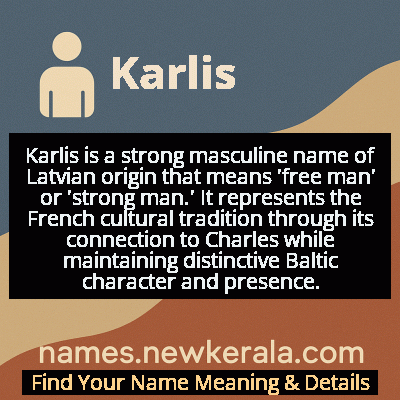Karlis Name Meaning & Details
Origin, Popularity, Numerology Analysis & Name Meaning of Karlis
Discover the origin, meaning, and cultural significance of the name KARLIS. Delve into its historical roots and explore the lasting impact it has had on communities and traditions.
Name
Karlis
Gender
Male
Origin
French
Lucky Number
7
Meaning of the Name - Karlis
Karlis is a strong masculine name of Latvian origin that means 'free man' or 'strong man.' It represents the French cultural tradition through its connection to Charles while maintaining distinctive Baltic character and presence.
Karlis - Complete Numerology Analysis
Your Numerology Number
Based on Pythagorean Numerology System
Ruling Planet
Neptune (Ketu)
Positive Nature
Intuitive, analytical, spiritual, and inquisitive.
Negative Traits
Secretive, reserved, aloof, and can be overly critical.
Lucky Colours
Green, yellow.
Lucky Days
Monday.
Lucky Stones
Cat’s eye, moonstone.
Harmony Numbers
1, 5, 6.
Best Suited Professions
Scientists, researchers, spiritual leaders, detectives.
What People Like About You
Depth of knowledge, analytical skills, spirituality.
Famous People Named Karlis
Kārlis Ulmanis
Statesman
First Prime Minister of Latvia and four-time head of government
Kārlis Šadurskis
Politician
Former Minister of Education and Science of Latvia
Kārlis Skrastiņš
Ice Hockey Player
Latvian professional defenseman who played in the NHL
Kārlis Lasmanis
Basketball Player
Latvian 3x3 basketball player, Olympic gold medalist
Name Variations & International Equivalents
Click on blue names to explore their detailed meanings. Gray names with will be available soon.
Cultural & Historical Significance
The name's journey from Germanic roots through French nobility to Baltic adaptation demonstrates how names evolve across cultures while retaining core masculine qualities of leadership and strength. This cross-cultural heritage makes Karlis particularly significant in modern European contexts, representing both historical depth and contemporary multicultural identity. The name serves as a reminder of the interconnectedness of European cultures and the way naming traditions reflect historical relationships between nations.
Extended Personality Analysis
Individuals named Karlis are typically perceived as strong-willed, dependable, and possessing natural leadership qualities. They often exhibit a balanced combination of traditional values and progressive thinking, making them effective in both conservative and innovative environments. Their strength is not merely physical but manifests as emotional resilience and intellectual fortitude. Karlis tends to be practical yet visionary, capable of both detailed planning and big-picture thinking.
These individuals often command respect through their consistency and reliability rather than overt dominance. In social settings, they may appear reserved initially but reveal deep loyalty and protective instincts toward those they care about. This combination of steadfastness and adaptability makes them particularly effective in leadership roles where both tradition and innovation are valued. Their approach to challenges is typically methodical and determined, reflecting the name's connotations of strength and freedom exercised with responsibility and wisdom.
Modern Usage & Popularity
In contemporary times, Karlis maintains steady popularity in Latvia and among Latvian diaspora communities worldwide. While not commonly used in French-speaking regions, it represents a distinctive choice for parents seeking a name with European heritage and strong masculine connotations. The name has seen renewed interest in recent years as multicultural naming trends encourage rediscovery of traditional names with international appeal. In global contexts, Karlis offers a unique alternative to more common variations like Charles or Carl while maintaining the same root meaning. Its usage remains most concentrated in Baltic communities but shows gradual increase in cosmopolitan areas where parents appreciate its strong sound and cultural depth without being overly common.
Symbolic & Spiritual Meanings
Symbolically, Karlis represents freedom, strength, and leadership across cultural interpretations. The name carries connotations of masculine authority tempered with wisdom and responsibility. In its essence, it symbolizes the 'free man' who exercises his liberty with judgment and honor. The name also embodies cultural bridge-building, representing the interconnection between Western and Eastern European traditions. Metaphorically, Karlis suggests a foundation of stability—like the bedrock that supports structures while allowing for growth and adaptation. It symbolizes the balance between individual strength and community responsibility, making it representative of ideal masculine virtues across multiple cultural contexts where strength is valued alongside wisdom and cultural awareness.

